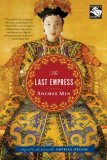Summary | Excerpt | Reviews | Beyond the Book | Read-Alikes | Genres & Themes | Author Bio

Critics' Opinion:
Readers' Opinion:
First Published:
Mar 2007, 320 pages
Paperback:
Apr 2008, 336 pages
 Book Reviewed by:
Book Reviewed by:
BookBrowse Review Team
Buy This Book
This article relates to The Last Empress
Dowager Empress Tzu Hsi (spelled Cixi in Pinyin; pronouced Tsoo Shee) had a bad reputation while she lived and after she died. However, in recent decades the tide of historical opinion has been shifting. Much of the West's view of Cixi comes from the writings ofEdmund Backhouse (1873-1944) who claimed to have had close contact with the Empress over many years and portrayed her as a ruthless, extravagant, psychopathic nymphomaniac. However, in 1974 Backhouse was revealed to be an unmitigated fraud. Unfortunately, by that time, false information about the Empress had been in circulation in the West for many decades; with similar misinformation circulating in China, where it suited the Confucian view of history to blame the woman whenever possible!
ArtistKatherine Carl spent 10 months with the Empress in 1903 while painting her portrait and described her as shrewd, but with great presence, charm, and graceful movements resulting in "an unusually attractive personality". Charles Denby, American envoy to China, reported in 1898 that Tzu Hsi "has shown herself to be benevolent and economical," and went on to add, "Her private character is spotless."
What was the Empress Cixi really like? We'll never know for certain, but it's likely that she was somewhere between Min's portrayal, and the woman described as the "mastermind of pure evil and intrigue" by Chinese textbooks as recently as 1991.
Pronouncing Chinese
Pinyin uses Roman letters to represent sounds in Standard Mandarin (the dialect of Mandarin spoken in Beijing). The system was developed in 1954 by the Chinese Ministry of Education in order to improve the literacy rates of adult Chinese (a couple of dozen letters being easier to learn than the more than 40,000 characters that make up Standard Mandarin). The only catch from an English speaker's point of view is that many of the Roman letters representing the Mandarin sounds do not match the sounds that English speakers associate with these letters. So if you have not studied Chinese or the Pinyin system beware of sounding out Chinese words written in Pinyin! If you feel inclined to brush up on your Chinese pronunciation try visitingpinyinpractice.com (click on the syllables in the middle of the screen to hear how they are supposed to be pronounced).
Interesting Links
Filed under People, Eras & Events
![]() This "beyond the book article" relates to The Last Empress. It originally ran in May 2007 and has been updated for the
April 2008 paperback edition.
Go to magazine.
This "beyond the book article" relates to The Last Empress. It originally ran in May 2007 and has been updated for the
April 2008 paperback edition.
Go to magazine.




Harvard is the storehouse of knowledge because the freshmen bring so much in and the graduates take so little out.
Click Here to find out who said this, as well as discovering other famous literary quotes!
Your guide toexceptional books
BookBrowse seeks out and recommends the best in contemporary fiction and nonfiction—books that not only engage and entertain but also deepen our understanding of ourselves and the world around us.